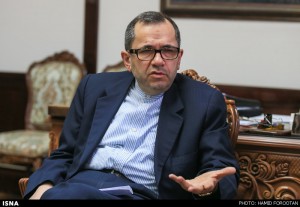 Vienna, Apr 10, IRNA – Iranian deputy foreign minister for Europe and American affairs and member of nuclear negations team met and conferred with secretary general of Austrian Foreign Ministry Wednesday evening on sidelines of Vienna 3 talks.
Vienna, Apr 10, IRNA – Iranian deputy foreign minister for Europe and American affairs and member of nuclear negations team met and conferred with secretary general of Austrian Foreign Ministry Wednesday evening on sidelines of Vienna 3 talks.
Majid Takht-e Ravanchi in the meeting with Michael Linhart appreciated the Austrian government for fine hosting of Iran?s nuclear negotiations with the 5+1G (the UN Security Council big 5 plus Germany, also known as the E3+3 and the P5+1) and briefed him on the latest status of those talks.
Takht-e Ravanchi meanwhile stressed the importance of the two countries? relations and reviewing the background of cooperation between Vienna and Tehran, reiterating that exchange of high ranking delegations was of great significance in improvement of bilateral cooperation and ties.
The Austrian diplomat, too, in the meeting expressed satisfaction over the positive process of the ongoing nuclear negotiations in Vienna, announcing Austria?s interest in expansion of comprehensive relations with Iran.
That is while the Austrian President Heinz Fischer has accepted an invitation to visit Iran, his office said, the first trip for many years by a Western head of state.
As of President Hassan Rouhani?s taking the lead in Iran the European countries have started to improve relations with Tehran, especially in economic field.
Fischer?s visit, most perhaps accompanied by business Austrian moguls, would be of both political and economic significance, contrasted with the United States? pressure over the Western countries to limit commerce with Tehran, the Reuters reported.
?The invitation from the Iranian side has been accepted in principle but no date has been set,? Fischer?s spokesman said, declining to give any more details given the delicate diplomacy at stake.
No western head of state visited Iran under President Rouhani?s predecessor, who was president from 2005 to 2013. However a former Austrian President Thomas Klestil had visited Iran in 1999 and 2004 when President Mohammad Khatami was in office.
Austria was for centuries a bridgehead for Iranian trade to Europe.
Lately it has been hosting talks between Tehran and six world powers that seek to expand on an interim deal engineered last year in which Iran agreed to freeze parts of its nuclear program in return for limited relief from sanctions.
That is while the Austrian Foreign Minister Sebastian Kurz will travel this month to Iran, his ministry said.
A spokesman for Kurz?s ministry said that the program for the Iran trip was still under discussion.
A senior US official visited Vienna in January to voice concern that Austrian companies, hoping to win post-sanctions business in Iran, had visited Tehran in December.
A diplomatic source said that Fischer could visit Iran by mid-year ?but this depends on a lot of things?, including the status of the nuclear talks, which are aimed at reaching a comprehensive agreement by late July.
Iran last month warned the Austrian embassy in Tehran after it hosted a meeting between EU foreign policy chief Catherine Ashton and Iranian human rights activists during her first visit to Iran.
But the flap appears not to have derailed ties severely.
Iranian Foreign Minister Mohammed Javad Zarif later in March spent more than an hour and a half meeting members of Austria?s parliament to discuss Iranian relations with the West, its nuclear program, human rights and the situation in Syria, participants said.
European companies are sizing up the potential of an end to the economic isolation of Iran, attracted by its young population of 76 million people, its urgent need to overhaul its modern infrastructure, and its massive oil and gas industry.
Austrian trade with Iran last year marked imports at 16 million Euros ($22 million) and exports at 185 million, according to preliminary data.
By IRNA
The Iran Project is not responsible for the content of quoted articles.

 QR code
QR code